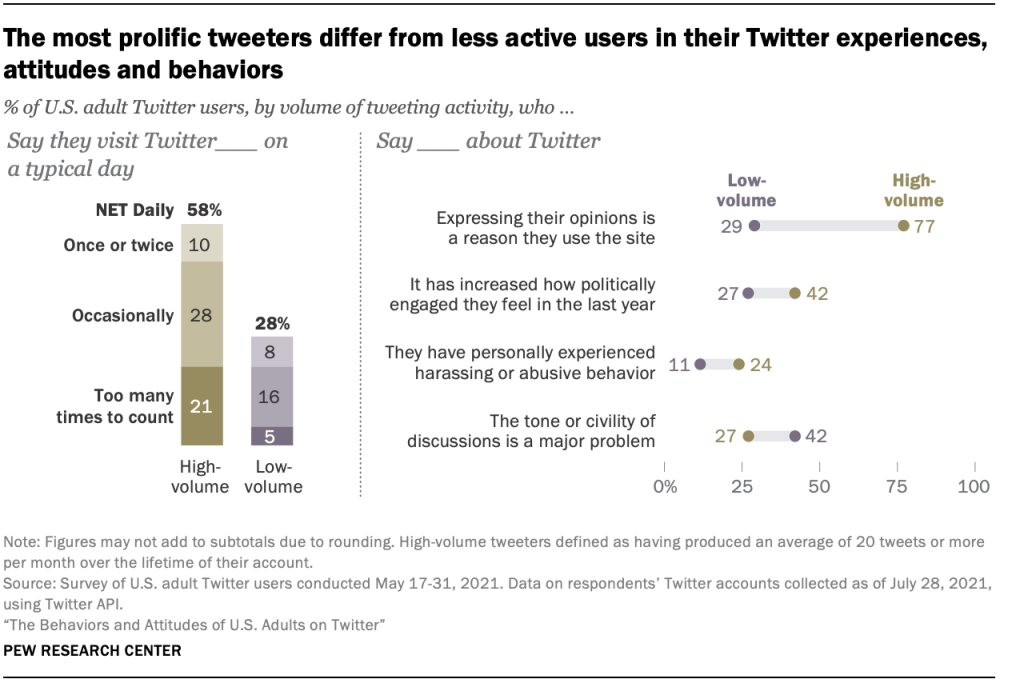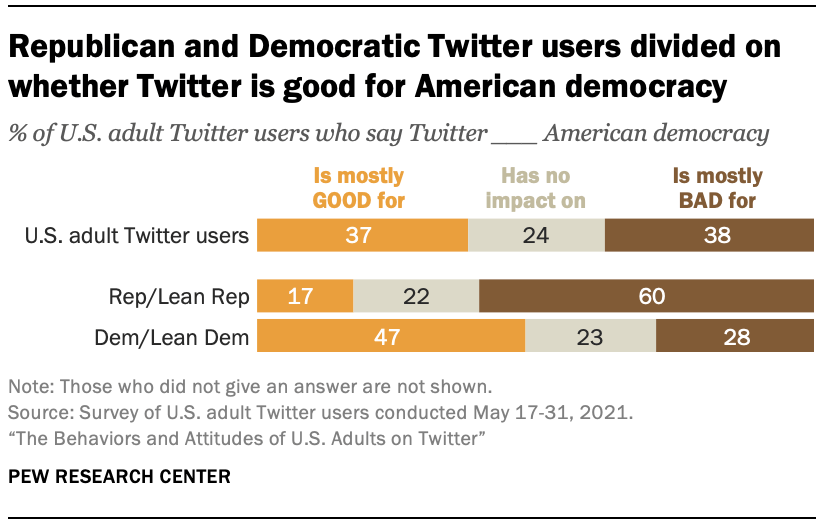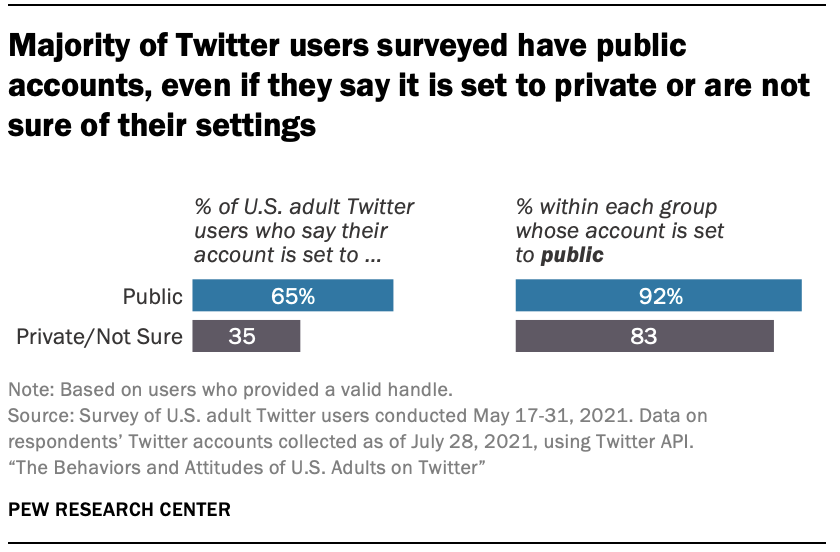A minority of Twitter users produce a majority of tweets from U.S. adults, and the most active tweeters are less likely to view the tone or civility of discussions as a major problem on the site
Pew Research Center conducted this study to gain insight into Twitter users’ views, attitudes and behaviors on the site, and how those opinions might vary based on their tweeting activity. For this analysis, we surveyed 2,548 U.S. adult Twitter users in May 2021. Everyone who took part in this survey is a member of the Center’s American Trends Panel (ATP) – an online survey panel that is recruited through national, random sampling of residential addresses – and indicated that they use Twitter. The survey also included 1,026 respondents who volunteered a valid Twitter handle (their unique user name preceded by an “@” sign) for research purposes. This allowed the Center to analyze their responses to the survey based on their actual (observed) behaviors on the platform.
Here are the questions used for the report, along with responses, and its methodology.
Roughly one-quarter of U.S. adults now use Twitter, and the site has become a space where users get news, discuss topics like sports, engage in personal communication or hear from elected officials.
Pew Research Center recently conducted an in-depth survey of U.S. adults who use Twitter, looking to better understand their behaviors and experiences on the site along with their attitudes towards the service. The survey included a subset of respondents who shared their Twitter profiles for research purposes, allowing their survey responses to be matched to their actual Twitter activity.
As in many of the Center’s surveys of technology and online platforms, this study finds that Twitter users report a mix of both positive and negative experiences on the site. For instance, 46% of these users say the site has increased their understanding of current events in the last year, and 30% say it has made them feel more politically engaged. On the other hand, 33% of users report seeing a lot of misleading or inaccurate information there, and 53% say inaccurate or misleading information is a major problem on the site.
The analysis also reveals another familiar pattern on social media: that a relatively small share of highly active users produce the vast majority of content. An analysis of tweets by this representative sample of U.S. adult Twitter users from June 12 to Sept. 12, 2021, finds that the most active 25% of U.S. adults on Twitter by tweet volume produced 97% of all tweets from these users.

High-volume tweeters differ from less prolific tweeters in important ways. A majority visit the site daily, and roughly one-in-five say they do so too many times to count on a typical day. Their use of Twitter also carries a more overtly political valence: They are more likely than others to say the site has increased how politically engaged they feel in the past year.
They also respond differently to the presence of certain negative interactions on the platform. High-volume tweeters are roughly twice as likely as others to say they have personally experienced harassing or abusive behavior on the platform (24%, vs. 11% of less active tweeters). But they are less likely to view the overall tone or civility of discussions on the site as a major problem (by a margin of 27% to 42%).
Among the other key findings of this research:
Although they produce the vast majority of content, highly active tweeters produce relatively few original tweets and receive little engagement from the broader Twitter audience. From June 12 to Sept. 12, 2021, original posts comprised just 14% of tweets from the top quarter of U.S. adults on Twitter by tweet volume. The vast majority of posts produced by this group were either retweets (49% of the total) or replies to other users (33%).
Posts from this group also receive little engagement from other users in the form of likes or retweets. Despite producing 65 tweets of any type per month on average during the period under observation, U.S. adults in the top 25% of users based on tweet volume received an average of just 37 likes and one retweet per month.

Democrats and Republicans on Twitter differ in their views of the major problems on the site and its overall impact on democracy. Nearly identical shares of Twitter users say the site is mostly good (37%) or mostly bad (38%) for American democracy, with 24% saying it has no impact either way. But Republican Twitter users (including Republican-leaning independents) are roughly twice as likely as Democrats and Democratic leaners to say the site is bad for American democracy (60% vs. 28%). Conversely, roughly half of Democrats who use the site say it is good for American democracy – just 17% of Republican users say the same.
Meanwhile, similar shares of Democratic and Republican users say that issues such as the tone or civility of conversations on the site or the presence of inaccurate or misleading information are major problems. But Republican users are far more likely to say it is a major problem that Twitter limits the reach or visibility of certain posts (59% vs. 17%) or bans users from the platform (61% vs. 6%).

A majority of Twitter users – even those who say they have private profiles or are not sure of their privacy settings – have a public profile that is visible to anyone. Overall, 53% of Twitter users – and 65% of users who provided a handle that allowed the Center to verify their actual profile settings – say their profile is set to public, so that anyone can see it.
But an examination of the profiles of those users who provided a handle reveals that 89% of them are actually set to public. Among users who say their account is private or are not sure of their settings, 83% in reality have a public profile.




